In this article, you will learn how to make polvoron! This is perhaps one of the most popular Spanish desserts in all of Spain.
These cookies have their origin in Andalusia during the time of the inquisition, whereby eating them, people demonstrated their faith in the Catholic religion.
There is also a Filipino version of this dish, however, we’re going to focus on the Spanish recipe that’s used all over Spain and particularly in Southern Spain.
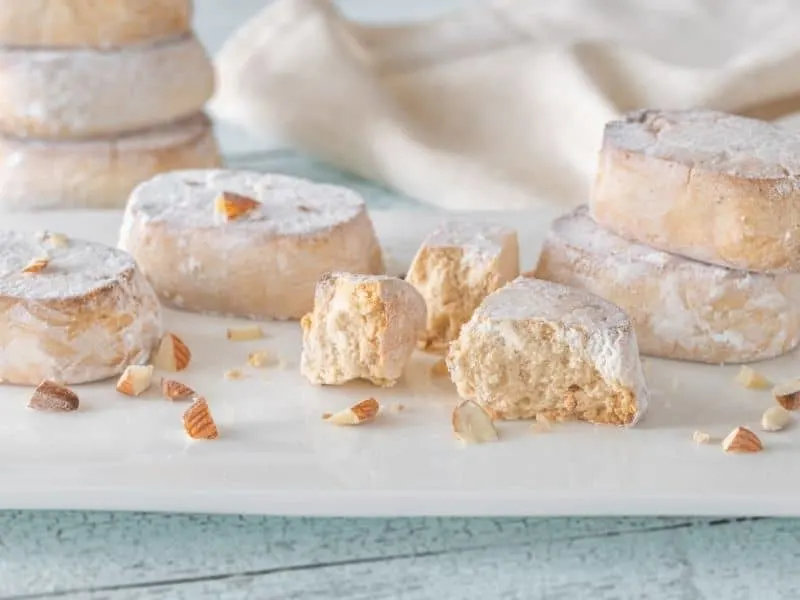
You, dear reader, support this blog. If you purchase through a link, we earn a small commission. As an Amazon Affiliate, we earn from qualifying purchases.
Background of the dish
Due to this relationship between polvoron and the Catholic religion, this type of cookie continues to be a main dish during Catholic festivities. It’s called a polvoron because it melts in your mouth.
This is a pun in Spanish since “polvo” means dust in English because that is how it feels when you eat it.
The provinces of Seville and Cadiz are the ones that produce the most this type of cookies, producing hundreds of tons per year. Therefore, you should not be surprised by the popularity of the cookie in Andalusia and throughout Spain.
Nowadays it’s one of the most popular Christmas foods in Spain!
Pin for later!
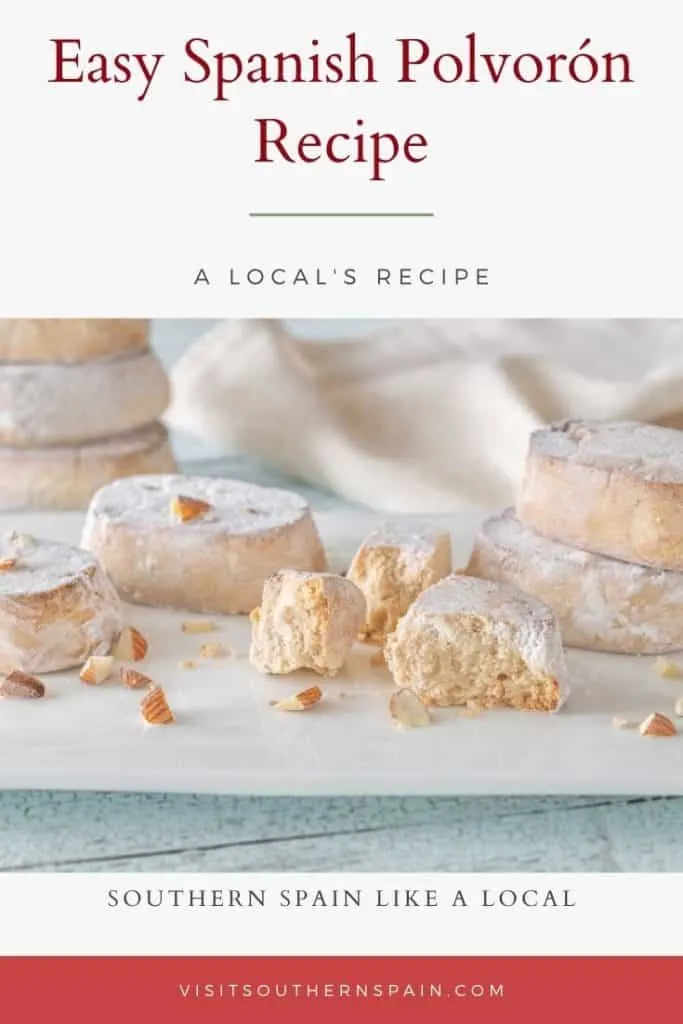
Things You’ll Need
To make this recipe of polvoron you’ll need the basic equipment that is used to make all kinds of cookies.
For example, you’ll need a cookie cutter, preferably a round one, but you can use any type you like such as a heart-shaped cutter, star-shaped cutter, anything will work!
If you don’t have cookie cutters don’t worry! You can use a glass or even cut the shape that you want with a knife.
Besides that, you’ll just need a cooking sheet and you are ready to start with this Spanish polvoron recipe!
If you’re after some of the best Spanish desserts and love chocolate, then make sure to try our ultimate Spanish Chocolate Chip Cookies Recipe.
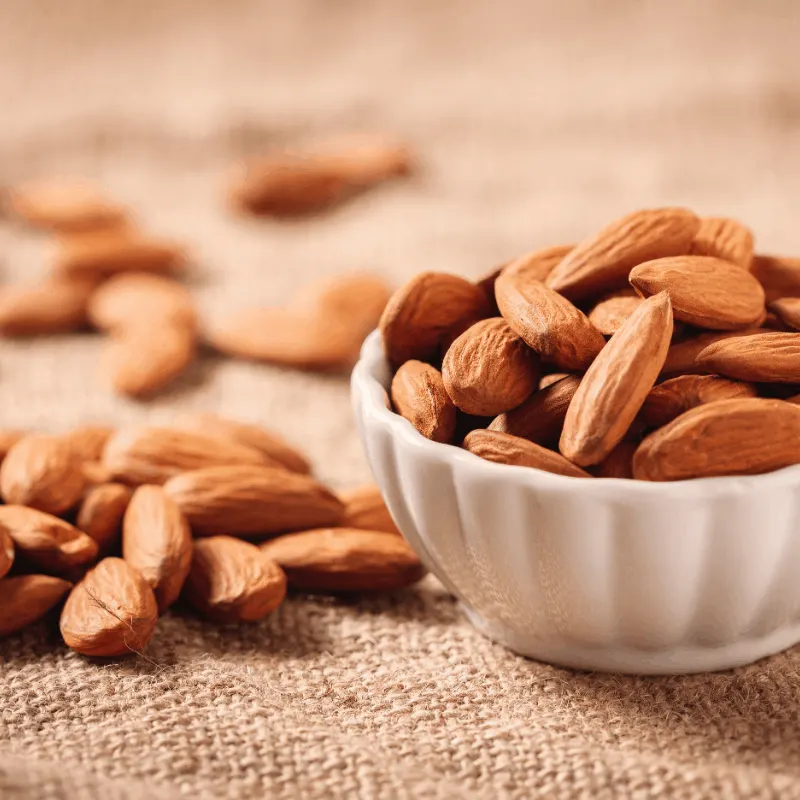
Ingredients
- 1 1/2 (180g) cups all-purpose flour
- 3/4 cups (150g) powder sugar
- 1/2 (110g) lard (or ⅔ cups of butter)
- 3/4 cup (83g) raw almonds, peeled
- ½ teaspoon cinnamon
- ½ teaspoon nutmeg
How to make Spanish Polvoron – Step by Step Guide
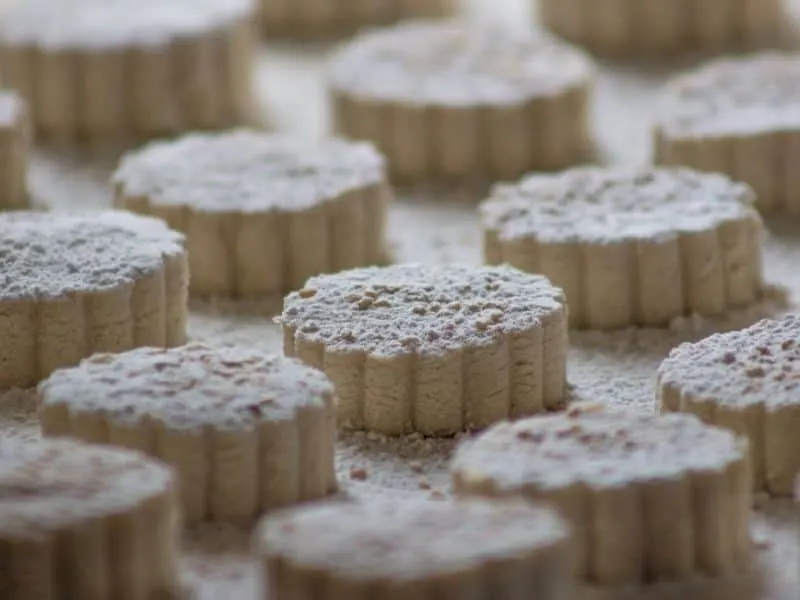
- First, preheat the oven at 180°c and in the meantime grind raw and peeled almonds until they look like flour.
- Mix flour and the ground almonds and place them on a baking tray. Put them in the oven and toast them for 8-10 minutes. From time to time rotate the tray, this way the mix will get an even toast.
- After that take them out of the oven and let them cool at room temperature. Meanwhile, mix powdered sugar and lard.
- Add the flour and almond mixture gradually to the bowl and mix everything until you end up with a crumbly dough that can also be worked into the shape of a ball. Cover the dough with plastic wrap and let it rest at room temperature for 30 minutes. If you put it to rest on the fridge the dough will get too hard making it difficult to work with.
- Dust some flour on the working surface and roll out the dough with a rolling pin until it is about one centimeter thick. With a round cookie cutter start cutting the dough and place the cookies on a baking tray. In the meantime preheat the oven at 180°c
- Bake your cookies for 15-20 minutes or until the edges get a golden color. Let them cool and dust some powdered sugar on top.
Substitution of ingredients
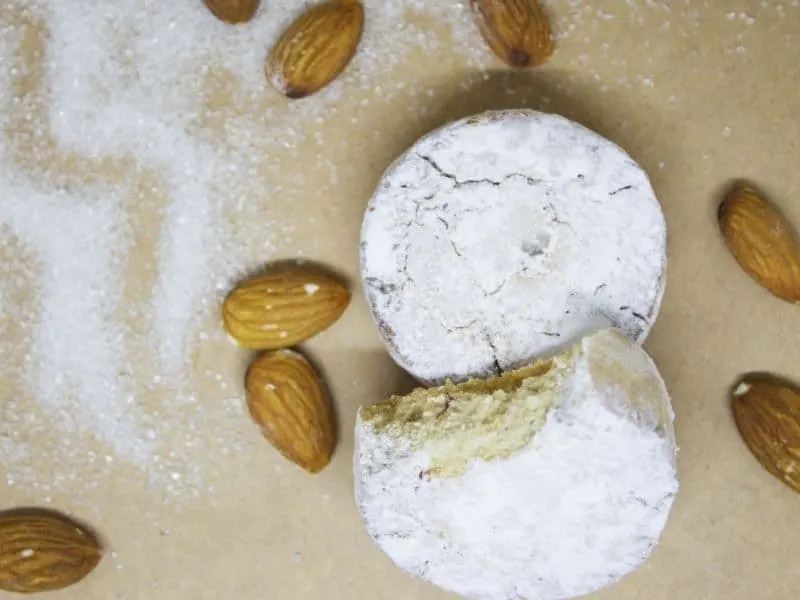
For this polvoron cookies recipe, there are many ingredients that you can replace or add new ones.
For example, you can replace the lard with the same amount of regular butter, even though you might not get the exact same crumbly texture.
You can also make a classic chocolate polvoron recipe by just adding 45g (3 tablespoons) of cocoa powder (without sugar).
Besides that, you can add 1 teaspoon of cinnamon or ½ teaspoon of nutmeg if you want to add those classic Christmas flavors to this cookie.
The polvoron nutrition facts will vary according to the ingredients you use for your polvoron cookies.
So if you or one of your guests it’s on a diet, you can lower some calories by using brown or organic sugar or replacing the amount of lard with any vegetable oil.
Mantecados are lard cookies as well, that are baked for Christmas in Spain and you must definitely try them.
Nothing says Christmas time more than a plate of polvoron, Spanish Marzipan, Christmas Pastries, or Turron.
Tips on Serving
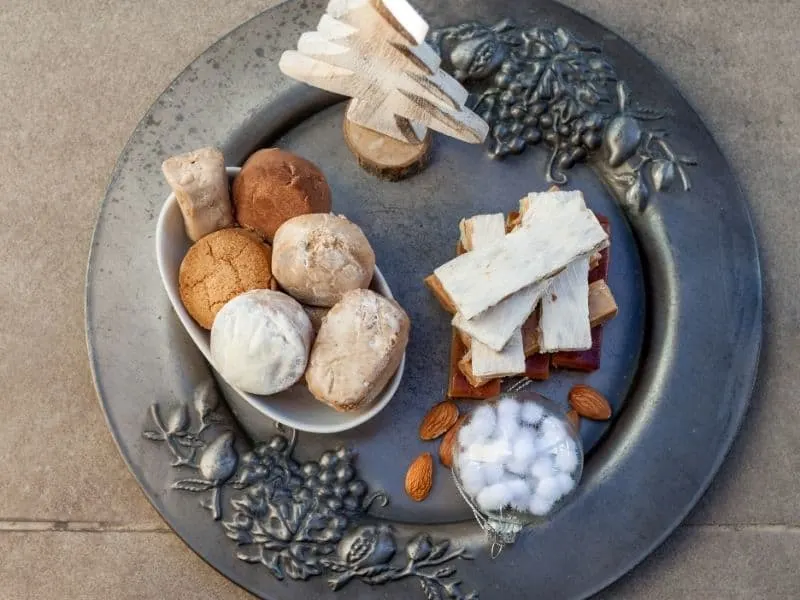
These cookies are commonly eaten during breakfast or as an afternoon snack during the holidays.
If you are looking for what to eat in Seville during Christmas time, you might find that they usually serve them with tea, so you can dip your cookies in it!
Any drink will go well with these cookies, from coffee to Spanish hot chocolate, everything works perfectly.
The best thing that you can do is prepare a big batch of cookies and let your guests grab as much as they want, the cookies will be done in seconds!
It’s one of the most popular Spanish dessert recipes during Christmas time. If you want to try yet another recipe served on a special holiday in Spain, the Santiago Apostol’s Day, make sure to try our Spanish almond cake.
How to store Spanish polvoron?
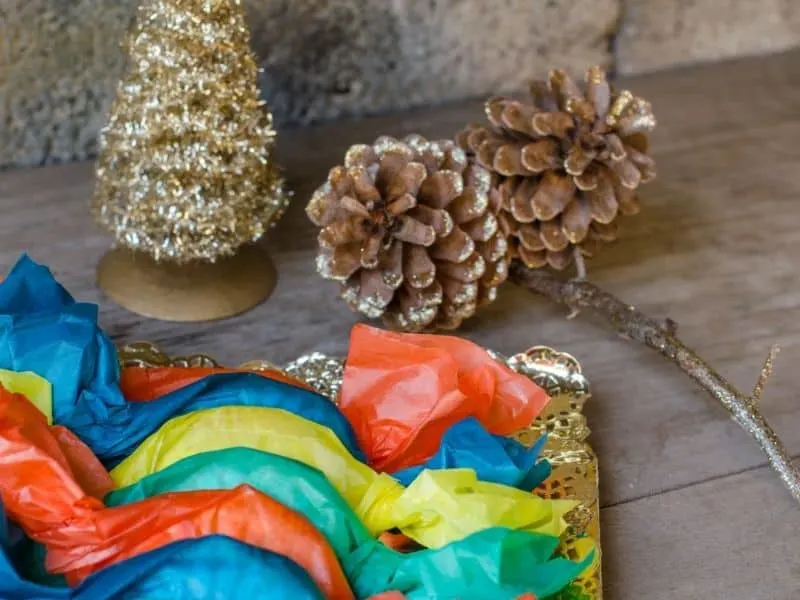
You can keep these cookies for two or three days in a tin or Tupperware, making sure they are well covered. If you want to freeze it, there are different ways and tips to do it.
If you have room in your freezer, the best thing you can do is freeze the raw dough but once that you cut it into a cookie shape.
This way once you remove it from the freezer you can put it directly in the oven, although it will probably take 5 or 10 more minutes to cook.
You can also freeze the raw dough before cutting the cookies, then when you want to defrost them you must take them to the refrigerator and wait a couple of hours or until you feel that it is ready to be stretched.
Here you have the recipe card, all handy, on how to make polvoron.
Recipe card – How to make Polvoron
Spanish Polvoron Recipe
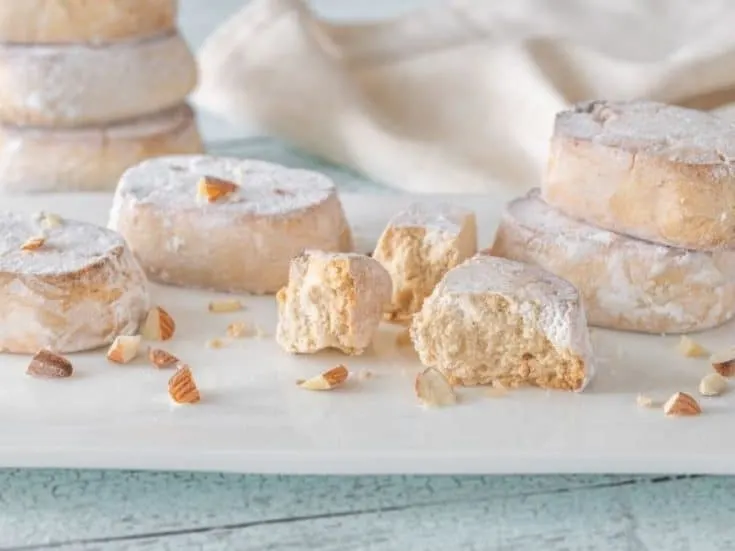
This is perhaps the most popular Christmas cookie in all of Spain.
These cookies have their origin in Andalusia during the time of the inquisition, whereby eating them, people demonstrated their faith in the Catholic religion.
There is also a Filipino version of this dish, however, we’re going to focus on the Spanish recipe that’s used all over Spain and particularly in Southern Spain.
Ingredients
- 1 1/2 (180g) cups all-purpose flour
- 3/4 cups (150g) granulated sugar
- 1/2 (110g) lard (or ⅔ cups of butter)
- 3/4 cup (83g) raw almonds, peeled
- ½ teaspoon cinnamon
- ½ teaspoon nutmeg
Instructions
- Grind the peeled raw almond. In the meantime preheat the oven to 180 °C
- In a tray suitable for the oven with flour and ground almonds. Put them in the oven to toast for at least 8 -10 minutes. Rotate the tray so it toasts evenly.
- Take them out of the oven and let them cool. At the same time in another bowl mix the lard and powdered sugar.
- Add the flour and almond mixture gradually to the bowl and mix everything until you end up with a crumbly dough that can also be worked into the shape of a ball.
- With the dough that was formed, make a ball, cover it with plastic wrap and let it rest at room temperature for 30 minutes. Don't need to put it in the refrigerator because it will get too hard and difficult to handle.
- Then roll out the dough with a rolling pin until it is one centimeter thick
- Cut them out with a cookie cutter and carefully place them in a baking tray.
- While you fill the tray with cookies, preheat the oven to 180 ° C. Cook them at that temperature for 15 minutes
- Let them cool completely and dust them with powdered sugar.
Notes
You can add cinnamon and nutmeg to the flour since they’ll definitely add a Christmas flavor to the cookie!
Nutrition Information
Yield
4Serving Size
1Amount Per Serving Calories 179Total Fat 1gSaturated Fat 0gTrans Fat 0gUnsaturated Fat 0gCholesterol 0mgSodium 3mgCarbohydrates 37gFiber 1gSugar 2gProtein 5g
All information presented and written are intended for informational purposes only. You should not rely on this information as a substitute for, nor does it replace, professional medical advice, diagnosis, or treatment. If you have any concerns or questions about your health, you should always consult with a physician or other health-care professional. The writers and publishers of visitsouthernspain.com are not nutritionists or registered dietitians. Statements within this site have not been evaluated or approved by the Food and Drug Administration.
Short FAQ about Spanish Polvoron Recipe
What is polvorón?
Polvoron is a traditional Spanish Christmas food. Its name is a play on words in Spanish, since “polvo” in English means powder, due to the crumbly and soft texture of the cookie.
Where does polvoron come from?
They originated in Andalusia, and thanks to the fact that the southern region of Spain had a large port and advanced commercial activity, these cookies quickly reached the whole world. Nowadays it’s a popular dish in the Philippines too.
Why is lard used to make polvoron?
Lard was originally used because pork is an animal that abounds in the forests of Andalusia, so people had more access to it instead of the regular lard that we consume today. At that time, butter was hard to get.
![how to make polvoron recipe 4 - How to Make Polvoron [Spanish Polvoron Recipe]](https://visitsouthernspain.com/wp-content/uploads/2020/12/how-to-make-polvoron-recipe-4-683x1024.jpg.webp)
![how to make polvoron recipe 1 - How to Make Polvoron [Spanish Polvoron Recipe]](https://visitsouthernspain.com/wp-content/uploads/2020/12/how-to-make-polvoron-recipe-1-683x1024.jpg.webp)

Hola, I’m Paulina! Together with my team, we are passionate about Southern Spain. Here we share all you need to know for great times in Southern Spain with the best places to visit, stay and, of course, the best food to eat.
Let’s dive in and explore Southern Spain’s outdoors, food and culture con pasión!

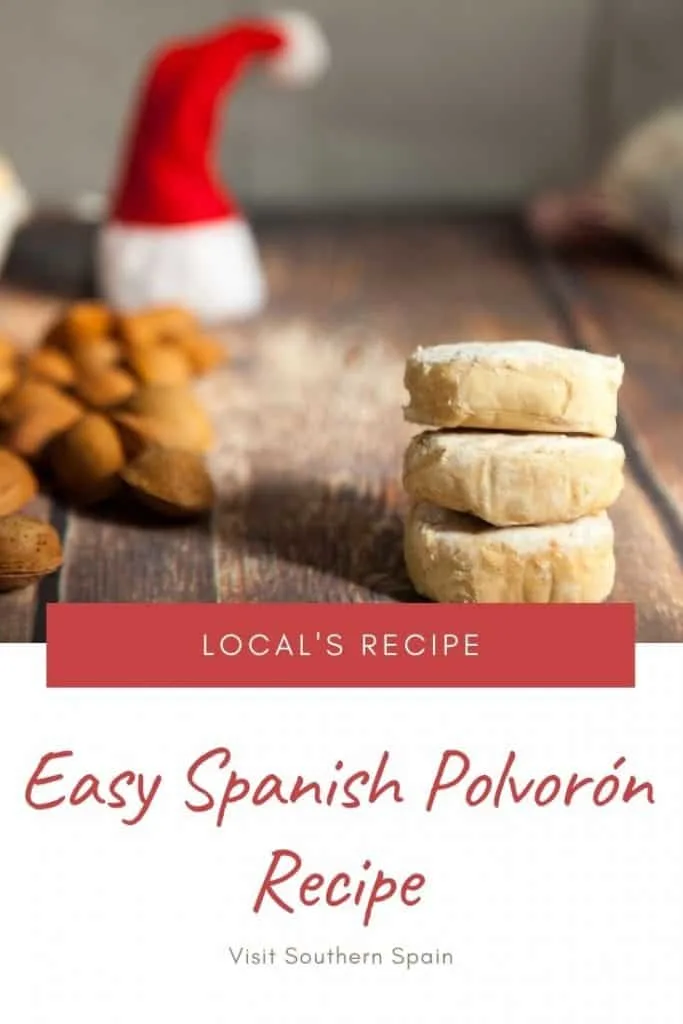
Evans
Wednesday 20th of December 2023
What consistency is the dough supposed to be? Mine is too dry to stick together
Paulina
Friday 5th of January 2024
Hi dear, thank you so much for your comment. The article has been updated with the requested info. thank you so much
Melissa F
Friday 15th of December 2023
Hello, the amount of flower is way too much if you are baking with butter for sure. Upon research 2 1/2 cups of flour would be more accurate for 400 g than 3 1/2 cups. Our cookies are pure powder right now and we don’t know how to fix that. There is no way a dough can be formed and we followed the recipe precisely! Just so you know!
Paulina
Friday 5th of January 2024
Hi Melissa, the recipe has been updated with the requested information. Thank you so much and enjoy!
dc
Friday 3rd of November 2023
I put the flour and almonds in the oven for 15 minutes and went to stir it and they were completely burnt by that time. :( I think 5-10 minutes is the right time to shoot for.
Paulina
Monday 20th of November 2023
Hi there! Your input was incredibly helpful. Thanks to your comment, I've updated the blog post with the information you mentioned. I appreciate your engagement and hope you enjoy the revised content!
Minou
Saturday 10th of September 2022
Hi! I'm going to bake polverones. Can I really use ordinary cookie cutters? I've seen a special polverones mould used for the Filipino version.
Paulina
Tuesday 20th of September 2022
Hi! Yes, you can use ordinary ones.
Courtney
Saturday 18th of December 2021
My favorite polvorones were the lemon ones, how would I make that flavor?
Paulina
Wednesday 22nd of December 2021
Hi dear, thank you for your comment. For a more intense lemon flavor, you can add some lemon zest to the dough.